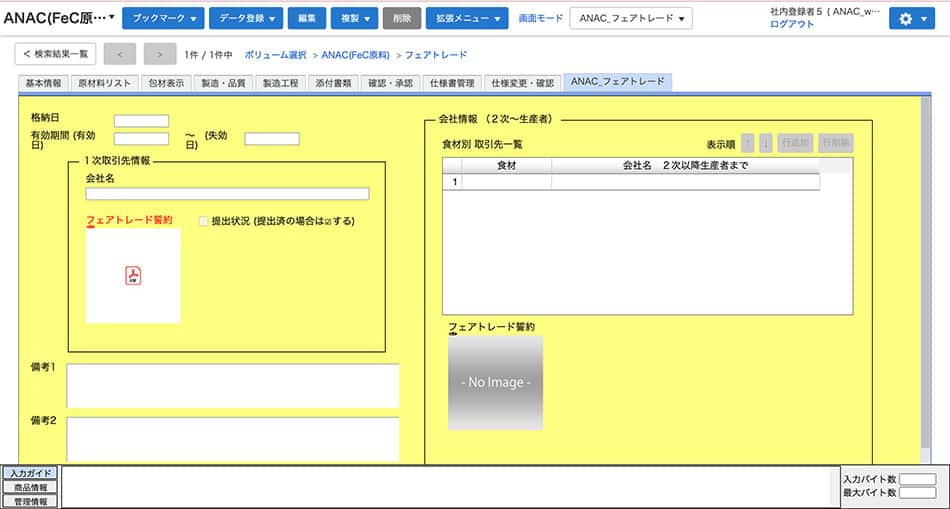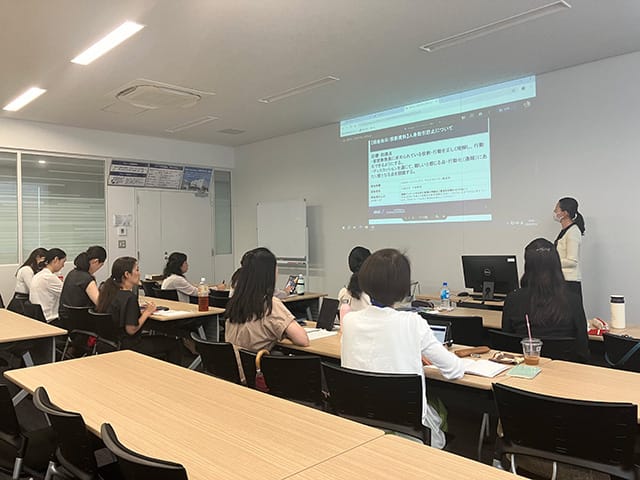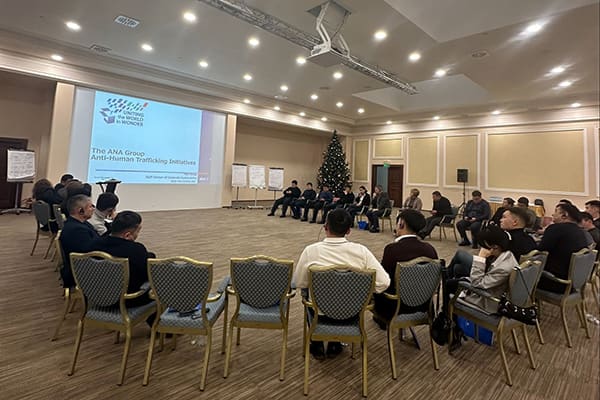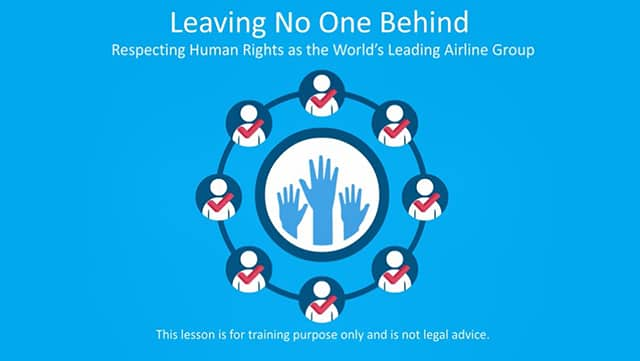Major Initiatives
- Theme 1: Respect the Human Rights of Migrant Workers Working at Contractors and Vendors in Japan and Overseas
- Theme 2: Identify Human Rights Issues and Environmental Burdens in the Supply Chain
- Theme 3: Prevent the Use of Airplanes in Human Trafficking
- Theme 4: Protect Customer Information and Give Consideration to Privacy
- Theme 5: Respect Human Rights When Providing AI, Metaverse and Other Services
- Examples of Responses to Other Human Rights Issues
- Training our Staff
Priority Human Rights Themes
Theme 1: Respect the Human Rights of Migrant Workers Working at Contractors and Vendors in Japan and Overseas
- Why We Consider This Theme To Be Important
Workers of a wide range of nationalities support the ANA Group's business activities. Recent media reports have uncovered various human rights abuses of foreign technical interns and students from abroad in Japan. Since many foreign workers work in the ANA Group's supply chain, we believe that there are potential human rights risks, and since 2016 we have made this a priority humanrights theme and have taken various measures, focusing mainly on group companies and their partner firms such as contractors. In the future, we will expand the scope of our work environment monitoring to include IT vendors and other parties, and we will take steps in accordance with international standards. - Relevant Stakeholders
- ANA Group employees
- Employees of partner firms (contractors and IT vendors, etc.) in Japan and overseas
- Foreign workers and other individuals employed at the above firms, etc.
- Activities
The ANA Group has built a system to grasp the actual employment status of foreign workers and make improvements in reference to the opinions of the workers themselves. It is composed of the following three steps:
STEP 1: Determination of employment conditions
By making effective use of the Global Supply Chain Worker Data Management System, we have been collecting data, such as the following, from ANA Group companies as well as from the Group’s major partner companies and suppliers in order to identify the actual employment status of foreign workers (e.g., number of persons, nationality, and status of residence). Also, to obtain data about the business and human rights-related initiatives implemented by these companies, we have been asking them to respond to the surveys on compliance with the ANA Group’s Basic Procurement Policy and the Supplier Code of Conduct and on measures for human rights and environmental issues.
(The enrollment of a total of 6,109 foreign workers from 64 countries was confirmed as of FY2024 as a result of conducting a survey on 41 ANA Group companies and 157 ANA Group contractors and suppliers.)
STEP 2: Direct questionnaire surveys of foreign workers
Based on the results of the employment conditions survey, we conduct a questionnaire survey directly targeting specified skilled workers and technical interns, who are considered to be among the foreign workers who are at high risk of experiencing human rights violations, to collect their opinions. The questionnaire form is composed of 34 questions based on the Dhaka Principles, which are international standards, and is conducted online in 10 languages as an anonymous survey. The results are utilized for the analysis of human rights-related risks.
STEP 3: Face-to-face interviews of foreign workers
We directly interview foreign workers who have been deemed as potentially at risk of experiencing human rights violations and check their living spaces, receiving support from the third-party organization CRT to ensure the objectivity and neutrality of the interviews.
We follow these three steps each fiscal year, and when an issue is identified we inform the relevant Group companies, major partner companies and suppliers accordingly so that we can make improvements together.
We will continue to conduct regular surveys into the employment conditions of migrant workers in our supply chain, and examine safe and reliable channels for recruiting migrant workers at the ANA Group and throughout our supply chain.

Theme 2: Identify Human Rights Issues and Environmental Burdens in the Supply Chain
- Why We Consider This Theme To Be Important
With advancing globalization in recent years, corporate supply chains are also expanding throughout the world. At the same time, to solve problems such as forced labor and child labor that are prevalent around the world, not only government agencies but also corporate entities must take responsibility for their entire supply chain and exercise appropriate control. In fact, there are many cases where the brand value of a client has been significantly damaged due to problems discovered at a supplier. Legislation to have companies check and report human rights and environmental issues in the supply chain is making progress in each country, and we believe that failure to address these issues will be a major management risk.
A single airplane consists of approximately three million parts, and the supply chain for these is both complex and extensive. Although the core business of the ANA Group is aviation, our mission is also to provide a safe, secure, and comfortable in-flight environment for our passengers. Therefore, we believe that building a highly transparent and traceable supply chain not only for aircraft parts but also for in-flight meals and in-flight goods is essential to fulfilling our responsibility to our customers. - Relevant Stakeholders
- ANA Group companies
- Partner firms and contractors
- Business partners
- Workers employed above, etc.
- Activities
Supply Chain Management for In-flight Meals Provided by ANA CATERING SERVICE CO.,LTD. (ANAC)
As our basic platform for managing our suppliers, we use eBASE, a product information database. The database software supports the construction, integrated management, and utilization of product and content information within the company as well as the exchange of product information between companies. Approximately 95% of ANAC's tier 1 suppliers have introduced this software. Using eBASE, the ANA Group has obtained signed pledges of the ANA Group Supplier Code of Conduct from 146 tier 1 suppliers and six tier 2 suppliers.
For high-risk and medium-risk suppliers, every year we confirm the employment status of foreign workers through the Survey of the Employment Status of Foreign Workers conducted by ANA HOLDINGS INC. Furthermore, to build good relationships with suppliers, we regularly hold "ANAC Suppliers Gatherings", which serve as a forum for sharing information.
For high-risk suppliers, in addition to regular hygiene audits, ANAC employees make direct visits every year to conduct checks in accordance with the ANA Supplier Code of Conduct. In addition, we make efforts to determine the views and opinions of workers by providing information about ourgrievance mechanism "Ninja".

Theme 3: Prevent the Use of Airplanes in Human Trafficking
- Why We Consider This Theme To Be Important
With flights to cities all over the world, the ANA Group is a global airline group connecting Japan and the world.
However, there is a risk that services provided by airlines like ours could inadvertently be used by third parties to violate human rights, and one typical example of this is human trafficking. Human trafficking is said to be the fastest growing crime in the world, and we believe it is our responsibility to make efforts to prevent human trafficking.
The issue of human trafficking was raised at the IATA’s annual general meeting in Cancun, Mexico in June 2017. Furthermore, at an annual review with human rights experts in September 2017, they recommended that the group address the issue of preventing human trafficking as one of our priority human rights themes. The ANA Group is working with other airlines, industry organizations, relevant ministries and agencies, and civil-society organizations to promote initiatives to prevent human trafficking. - Relevant Stakeholders
- ANA Group companies
- Immigration Services Agency of Japan and other government agencies
- Industry organizations, etc.
- Activities
In April 2018, we invited representatives from the United States NPO Airline Ambassadors International* to Japan to present a workshop based on their human trafficking prevention training program for airlines. We also launched an e-learning course for all Group employees in December 2018. Further, in April 2019, we began concrete operations to prevent human trafficking. Specifically, employees report any suspected cases of human trafficking discovered in-flight.
In 2024, we conducted education and discussions for approximately 8,000 flight attendants belonging to ANA in a conference setting. On July 19th, we also organized a forum. In December, we were the only private airline to participate in a training session on the prevention of human trafficking in the Republic of Kazakhstan, organized by the International Organization for Migration (IOM) Kazakhstan.
We gave a presentation on the ANA Group's initiatives and the importance of public-private cooperation as a sector.
We will strengthen measures to prevent our services from being used to commit human rights violations.



- Airline Ambassadors International
Initially a network of airline employees, Airline Ambassadors International has become an NPO working to prevent human trafficking.
Theme 4: Protect Customer Information and Give Consideration to Privacy
- Why We Consider This Theme To Be Important
The ANA Group has always handled personal data in its mainstay air transportation business, such as collecting customers' names and contact information when customers purchase airline tickets. The personal data entrusted to us is handled with the strictest care and is protected and managed in accordance with the laws and regulations of various countries, including Japan's Act on the Protection of Personal Information. In addition, in non-air business that we are currently strengthening, we are required to provide information that meets the particular needs of individual customers. This means we need to collect and analyze information concerning individual customers such as customer attribute information, purchasing history in online shopping, and location information. When handling such information, we do not simply comply with laws and regulations, but proactively align our approach to privacy with social demands and quickly evolving times. We recognize that if consideration of the protection of customer data and privacy is lacking, there is a potential risk of human rights violations, so we have set this as a new priority theme. - Relevant Stakeholders
- ANA Group companies
- ANA Group customers and other stakeholders, etc.
- Activities
In accordance with our Fundamental Policy and Principles of Conduct, we work to ensure the security of personal data, to utilize personal data in a privacy-conscious manner, to ensure transparency, to educate and raise awareness among employees, and to strengthen governance with a global perspective. In November 2006, we launched "Privacy Guide" that explains our concept and approach to privacy protection in an easy-to-understand way, with illustrations and specific examples.
Theme 5: Respect Human Rights When Providing AI, Metaverse and Other Services
- Why We Consider This Theme To Be Important
In recent years, the ANA Group has been expanding its business areas from aviation to next-generation mobility, from the extraordinary to the everyday, and from the real to the virtual. avatarin Inc., a startup company launched by ANA HOLDINGS INC., is developing businesses that utilize artificial intelligence (AI) and areworking on projects using 3D virtual space built into smartphones.
While the research, development and utilization of AI enriches people's lives, there is a risk that, depending on its use, it maylead to privacy violations and other human rights issues. Recognizing the existence of unforeseen human rights risks, we have setthis as a new priority theme that we must address in the future. - Relevant Stakeholders
- ANA Group companies
- ANA Group customers and other stakeholders, etc.
- Activities
In 2024, we conducted an online dialogue on the utilization and governance of AI based on “AI and Human Rights” with experts from overseas.
Please see Dialogue with external experts on AI and Human rights for more detalis
Examples of Responses to Other Human Rights Issues
Corruption Prevention
With regard to anti-bribery measures, we have established the ANA Group Anti-Bribery Rules in order to comply with the anti-bribery laws of each country, and have put in place a system to minimize legal risks on a global level and prevent situations that may lead to a decline in corporate value. At the same time, there is a provision on how to respond when a violation is found. Training on the anti-bribery laws is provided for officers and employees of overseas branches in Japanese and English, along with training on competition laws. In addition, the ANA Group makes contracts with business partners conditional on efforts to prevent bribery and corruption.
Human rights of children
The impact assessment in 2019 identified new issues, such as human rights of children. Based on these results, we held an in-house seminar in December 2020 with the cooperation of Save the Children Japan*, a public interest incorporated association, to better understand the potential risks for the ANA Group in regard to human rights of children.
The reduction in the number of flights from the effect of COVID-19 had given rise to unused in-flight meals. Through Save the Children Japan, the ANA Group donated rice crackers, apple juice, etc. to children from single-parent households in May 2020. To keep children's spirits up while they had to stay out of school due to COVID-19, the ANA Group also donated some 20,000 chocolates to municipalities in the environs of Narita Airport.
- Save the Children Japan
Established in 1919, Save the Children, an international NGO, has been supporting children for over a century. Save the Children Japan was established in 1986 as a member of Save the Children. In partnership with governments and local communities in and outside of Japan, Save the Children Japan works to protect children's rights.
The human rights of our employees
At the ANA Group, we strive to always understand the customers' viewpoint and provide service that exceeds their expectations. On the other hand, we take a firm and resolute stance towards inappropriate actions or excessive demands from customers which reach the level of harassment, as these may significantly harm the rights and working environment of our employees. To ensure that the human rights of our employees and customers are mutually respected and to create a safe and comfortable environment for their use, we will continue to respond in accordance with 'ANA Group Policy on Customer Harassment' policy.
Training our Staff
The ANA Group ensures that all employees of the Group are aware of the Group's human rights initiatives, including our policies. Specifically, education and training on "business and human rights" is provided each year to new employees and new managers. We also provide e-learning programs for all employees of the Group to deepen their understanding of human rights.


Proprietary materials of ANA Group's in-house education.
- Do not copy or distribute without permission.